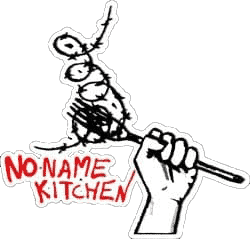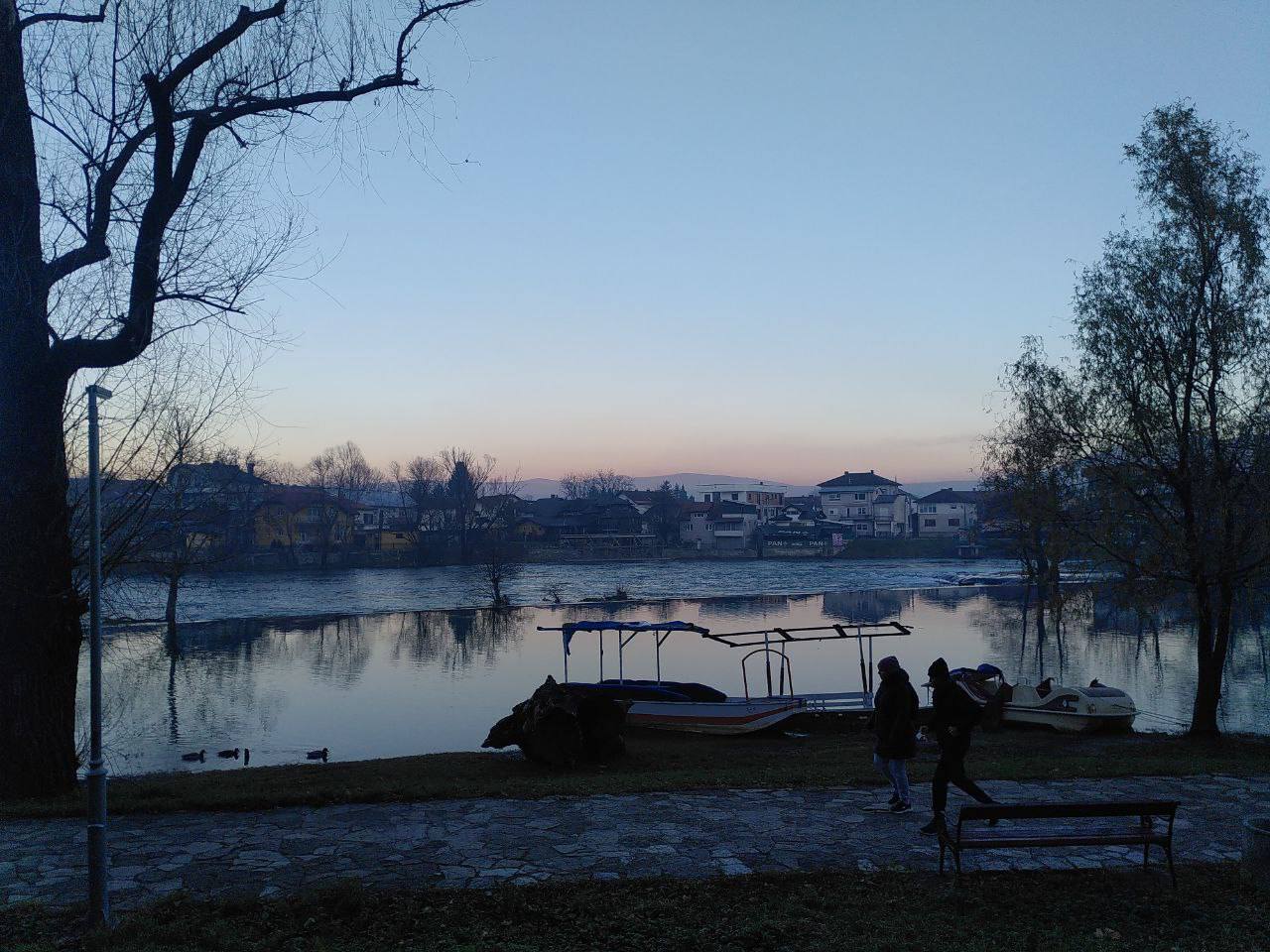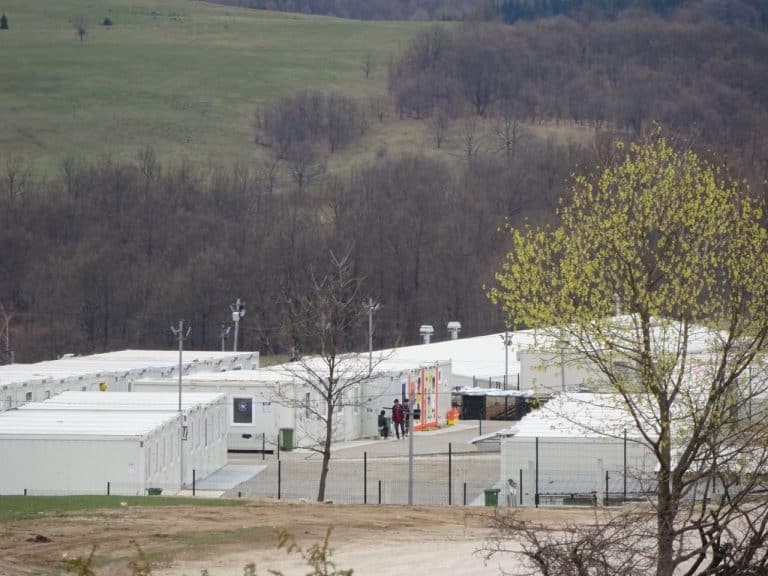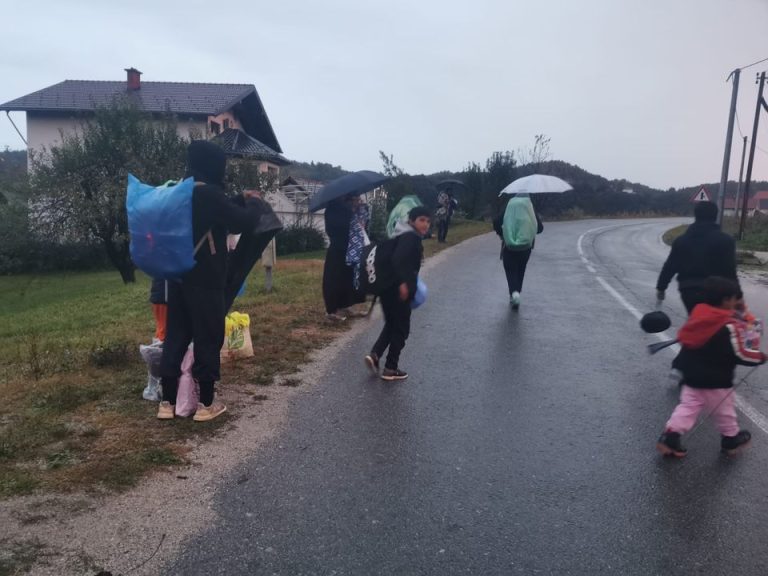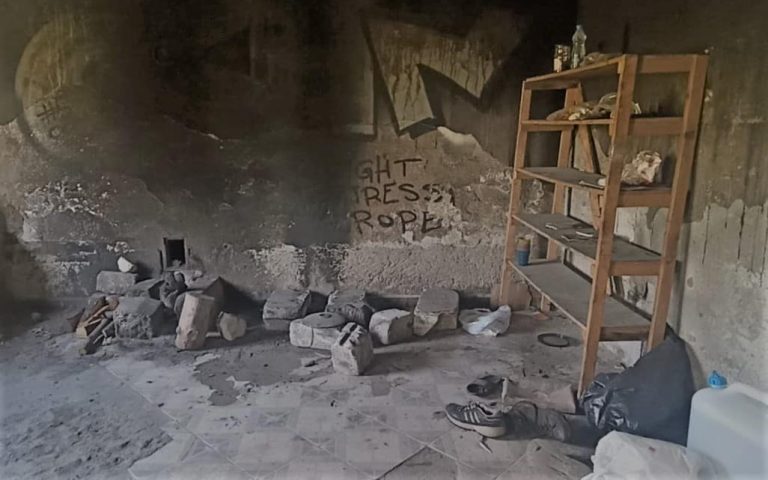By Masa Nazzal as part of the No Name Kitchen team in Bosnia and Herzegovina
The first world is the Bosnian world. Where stores never have a consistent working schedule so you have to try your luck to see if it’s open. It’s where the old man on the corner of the river sets up his little station for roasting chestnuts. Everyone looks prim and proper as they walk across the bridge with the puffiest winter jackets.
*Here you can also find all the article in Bosnian / Serbian / Croatian language. English continue below:
But as I walk through the city, there are apparent holes, small and big, on walls, big gapping voids on sidewalks, and broken down houses. This is where I remember the presence of a memory of past violence that has remained amongst life here. Bihać is a land filled with the remnants of war. A brutal war that has left its scar on land and people. The infrastructure still speaks to this violence. Bullet holes scattered across the walls of home. Where the entire city was under siege for 3 years in the mid-90’s. The war marked itself on bodies and minds. Its presence lingers not only in past memories and traumas, but as a physical mark left behind by the oppression of different forces fighting for control. As I walk across the streets I see the countless men who have lost limbs in the war. All carry the permanence of the violence.
My sweet 90 year old neighbour, Josip, recounts to us the suffocation of the occupation of the city. Its compression. How it enclosed spaces and people. How everyone lost something or someone in that time. Violence was a neighbour that lived on every corner. Now after 30 years, there is routine, Bosnians live in homes with relative safety not filled with the tragedy of war, but replaced now with economic crisis and an emigrating population.
In this same space as this Bosnian world exists a second world
Within it people who exist invisibly visible within Bihać society. The people who are on the move. For them, Bihać is a transit city, which is apparent with the countless people, usually men, who are walking along the sidewalks with backpacks. Either recovering from being pushed back by Croatian police: defeated looks, injured, tired and muddy. Or those who are on their way to continue their trip: fresh clothes, walking at a faster pace, backpacks intact filled with food to last them days and fully charged power banks, encouraged by a future in Europe that feels so close to them.
In both cases these people usually exist within Bihać in a few places, the Bihać Bus Station or squats. This is the world that my work exists in. As I spend endless days lingering on the benches outside the bus station in the freezing cold amongst people who aren’t allowed to seek warmth inside the station that is merely a few metres away. This is the world in which people on the move’s live, outside of society, unwelcome to join, even as a temporary visitor. This is the world of a segregated racist system embedded into the everyday lives of those I work among.
In my close friend, Moccine, I have seen how these systems can embed themselves in the psyche. Every time I take Moccine for coffee, to get lunch, or even for a doctor’s visit to check on his injuries he is timid. When I ask him what’s wrong, he tells me “I know I am not wanted in these places, I become shy being here, I don’t want to intrude on the life here”. I try to explain that he is not the intrusion that it is the society influenced by EU’s racist rhetoric and border policies that make life inhospitable, but my words don’t help the feelings that have now become so deeply embodied.
This feeling of intrusion is only amplified more by the way that society interacts with people on the move in Bihac. The segregation of this world becomes apparent when doing everyday actions. People on the move are forced to sit in the back of the bus, while the front is reserved for western tourists and Bosnians. As “No migrant allowed” signs scatter the city centre’s cafes, and those who don’t have the signs reject entree and service for people on the move the moment they walk into a store. They are forced to take their backpack’s off the moment they enter the giant supermarket because of the assumption that they will steal. Taxis and hotels purposely overcharge their services so that they can exploit the need of people who already have so little. They are forced outside. At all times, never able to integrate or interact with society. Invisibly visible.
Problem to access medical care
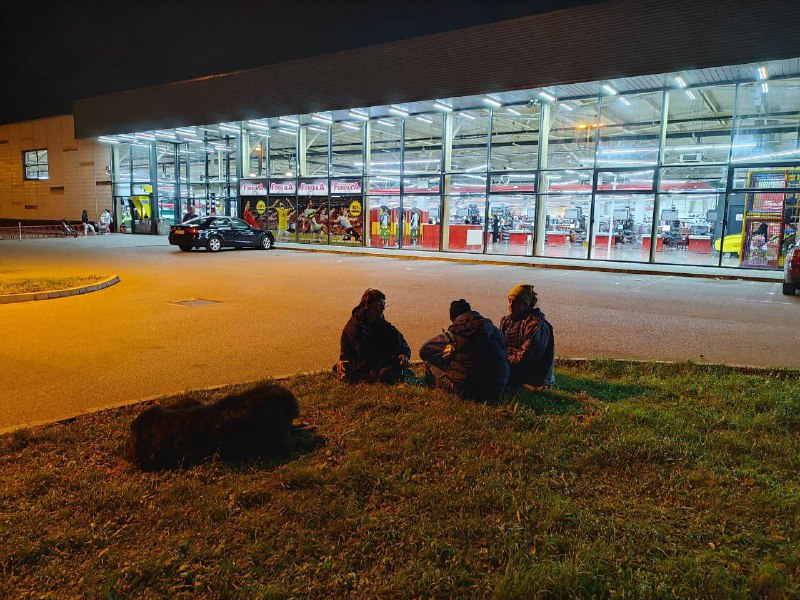
This unloving environment that people on the move have to exist in extends to the denial of emergency medical care. A week ago we were at the bus station doing distributions when we noticed that our Moroccan friend, Hamza, was turned blind in one eye. His pupil was becoming white, and he was saying he couldn’t see. He was living outside in the cold, with no money and no transport to go to the transit migrant camp. We decided to take him to the hospital even though the doctors usually turn us away, nonetheless, we wanted to try to talk to the medical professionals about Hamza’s immediate need for care.
No one was around, no line, no patients, around early evening at 8 pm. There were around four doctors sitting and 2 receptionists, all who had no one to tend to. After about five minutes of waiting a doctor arrived and asked my team member, Sori, to come with them alone, leaving Hamza waiting in the reception area.
The doctor started giving them an intervention, saying “We know this man, he comes here often, he is crazy, you can’t help him, you have to look after yourself. Those people from Morocco and Algeria, there is not even war, they are just coming, they are criminals. You have to protect yourself, they are dangerous.”
Once they left the room again another two doctors came, and told Sori and Hamza that they needed to leave the hospital. Sori tried to reason with them that if they wouldn’t provide him with medical care that they would at least call Lipa Camp, the migrant camp near Bihac, to transport him to see a doctor there. But they refused to even make a simple call. So Hamza was left, eyes still blinded, out onto the cold streets.
This is a complete rejection of the hippocratic oath that all doctors must take. An oath that requires to never reject care, it requires to do no harm. The countless times we have taken friends to the doctors only to be denied care is shocking. We have brought people to the doctors with gaping wounds that needed stitches, potential broken ribs, and people who suffered from epilepsy, in all these cases we have been denied care. These doctors have removed themselves from the ethics that their work requires. Instead of doing no harm, they are perpetuating harm.
The denial of care and service extend to all institutions of our western society. When trying to get a friend some legal counsel on asylum claims in Europe the lawyer we contacted denied service, but more so in the P.S. of the email she wrote, “ I can tell you that Moroccans have one of the lowest recognition [of asylum claims] rates anywhere”.
The discrimination of the people who do not come from countries in war
These dialogues in which Moroccoans are not seen as “worthy” migrants because they are not directly influenced by war has always shocked me. No one chooses to leave home. No one chooses to leave a life they know, the family they love, the culture they are a part of. No one willingly crosses by foot from Turkey toward the European Union without a need, a desperation, for something else from life.
Even more so, the issue with Morocco does not exist in a vacuum. The economic crisis that Moroccans live in isn’t self-inflicted. This is a product of decades of French colonialism that has stripped Moroccons of the right to their land and resources, and then profited off of this exploitation. And now France has the audacity to reject Moroccans because they are “economic migrants”.
Poverty is something worth seeking asylum from. Poverty is worth escaping home and seeking safety and security elsewhere. War should not be the only pathway for people to seek a different life. It is absurd, because it seems so obvious. What authority and power are they to decide who is most worthy to come to Europe? Poverty is a form of violence, even if the EU deems it not to be.
It is hard to ignore the systematic and everyday racism that surrounds people on the move, but it is also important to recount the moments of deep solidarity amongst locals here. We have met many courageous Bosnians, who give little of what they have to people on the moves. Isma, an elderly peasant woman, lives at the border between Croatia and Bosnia, everyday she sees dozens of people who have been pushed back, bloody, beaten and wet. She has very little yet she does not hesitate to give, and give all that she has. Her story exists amongst many people here who continue to help in even the smallest ways.
People are not the institutions and societies that they were raised into. What is right is formed from an instinctual ethics. That gut feeling that what is wrong should never be ignored, because it is in that feeling that guides us away from the systems of racism and inequality that we were all socialised into.
Now almost 2 months in the field I am thankful to be in a space that allows me to be so intuned with that gut feeling. I am in communion with my ethics here. It has transformed into the very foundation of all my action.
